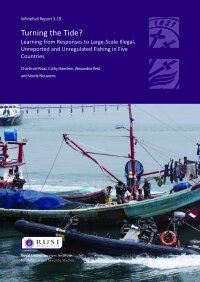By Charlie de Rivaz, Cathy Haenlein, Alexandria Reid and Veerle Nouwens.
Illegal, unreported and unregulated (IUU) fishing poses not only a systemic threat to the environment, but also a sustained threat to national and regional security. Valued at an estimated $10–23.5 billion per year, much IUU fishing takes place on a systematic and industrial scale for profit, with these large-scale operations increasingly recognised as a form of transnational organised crime. In recognition of the scale and sophistication of this threat, a growing number of policy recommendations have been made to help shape national and international responses. Yet progress in developing effective and practical measures has in many cases been limited. The result has been a collective failure, at a systemic level, to provide an adequate global response. This lack of progress has rarely been the subject of detailed cross-regional analysis. Indeed, while many affected jurisdictions have enacted key measures to address IUU fishing, little work has been done to assess the extent to which these measures have effectively mitigated the role that transnational organised crime plays in the IUU fishing industry. This report seeks to contribute to a more nuanced understanding of this area, considering obstacles to, and opportunities for, more effective action. It does so by examining experiences in five countries: Indonesia; Thailand; Vietnam; Tanzania; and South Africa. In each case, the report examines the approaches taken by those states and the successes and failures of their policies – aiming, in the process, to contribute to a more comprehensive understanding of the obstacles to – and opportunities for – more effective action. On the basis of a comprehensive literature review, 106 semi-structured interviews and four focus groups across the case study countries, this report outlines the key features of the multidimensional threat posed by organised, large-scale IUU fishing across the focus countries. It points, in particular, to high levels of convergence between this and other crimes, adding further complexity to the nature of the challenge posed by IUU fishing. In responding to this threat, the report considers the range of challenges encountered in bolstering legislative, regulatory and institutional frameworks, strengthening detection and interdiction capabilities, and enhancing investigation and prosecution. These range from an insufficient prioritisation of the upskilling of the human resources needed to operate new technologies sustainably, to uneven application of new legislation and regulations, to challenges ensuring that officers possess the breadth of skills required to identify the broader crimes with which IUU fishing intersects, among many others. In considering experiences in these areas, the report also identifies a number of opportunities to address these challenges, highlighting successes and best practice where these have emerged. To ensure progress in tackling the multidimensional threat posed, it is crucial that this real-world experience is regularly accounted for, with lessons learned translated into updated policy and practice. Based on the analysis, the following recommendations are offered to support this process. These do not seek to reiterate global recommendations made elsewhere, which affected countries worldwide have already sought to apply. Rather, they offer specific guidance on tailoring existing approaches, based on the lessons derived from the study of these five countries.
London: Royal United Services Institute (RUSI), 2019. 73p.



